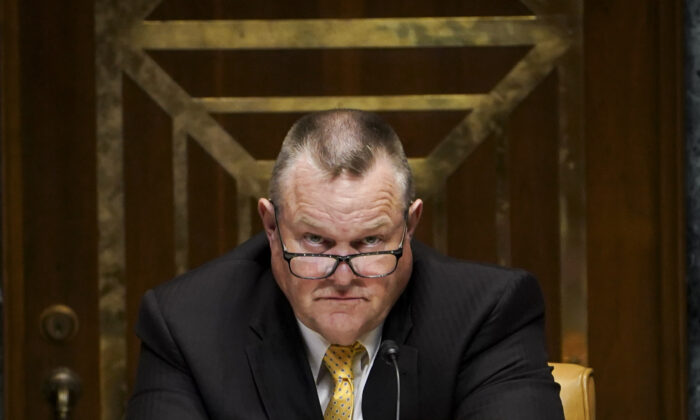Republican newcomer Tim Sheehy’s campaign to unseat the incumbent Democrat in the deep red Treasure State gains momentum as Nov. 5 election nears.
U.S. Sen. Jon Tester (D-Mont.) has won three elections as a self-identified “dirt farmer from Big Sandy” working the land his grandfather homesteaded more than a century ago, touting his bona fides as a High Plains centrist in an era of increasing ideological polarity.
The moderate Democrat appears to be counting on split-ticket voting in his campaign for a fourth, six-year Senate term.
Tester, 68, the only statewide-elected Democrat in deep red Montana, has trailed Republican challenger Tim Sheehy, 38, in polls by increasing percentages since August and is the Republicans’ top target in flipping the Democrats’ 51–49 Senate majority.
In 2022’s midterms, the GOP defended 20 of 34 seats up for grabs in the split 50–50 chamber. In 2024, Democrats and the four independents who caucus with them are defending 23 of 33 available seats on Nov. 5.
Republicans need to flip only two seats to notch chamber leadership.
Tester entered the 2024 election cycle as one of three Democratic Party senators seeking re-election in states that President Donald Trump won in 2020, and where Trump is the overwhelming favorite to win in 2024.
Two-term Sen. Joe Manchin (D-W.Va) became an independent and is retiring. West Virginia Gov. Jim Justice, a Republican, is the overwhelming favorite to succeed him in a state where Trump garnered nearly 69 percent of the vote four years ago.
Three-term Sen. Sherrod Brown (D-Ohio) is facing a “toss-up” challenge from Republican Bernie Moreno in Ohio, a former battleground state where the GOP is ascendant. Trump won by about 8 percent in both 2016 and 2020, Ohio’s largest deciding margins in a presidential race since 1988. The latter election was the first time since 1964 in which its voters didn’t select the winning presidential candidate.
Tester is seeking reelection in a supermajority GOP trifecta state where Trump won by 16.5 percentage points in 2020—nearly 21 percent in 2016—and that has been reliably Republican for decades. Voters haven’t elected a Democrat to the House since 1994 and only two Democrats since 1952—Bill Clinton in 1992 and Lyndon Johnson in 1964—have won presidential elections in Montana.
Tester has managed to stay afloat despite the state’s swelling red tide, winning his second reelection in 2012—the last time he was on the same ballot as the presidential election—by nearly 4 percent, while Republican presidential candidate Mitt Romney won Montana by 13.64 percent.
But Montana has changed. The state’s population has grown by about 38 percent over the last four decades and its number of registered voters has increased by 75 percent during that time, according to an analysis published by Montana Free Press as part of the Long Streets Project, a nonpartisan journalistic think tank.
It is one of 19 states where voters do not register by party affiliation. Surveys and studies by data services, such as Bothell, Washington-based L2, maintain that from October 2008 through May 2024, for every two Democrats who moved to Montana, more than three Republicans arrived.
L2’s data indicate that over the last 16 years, more than 13,500 self-identified Republicans moved to Montana compared to 8,548 self-identified Democrats. Nearly 13,000 from the same cohort self-identified as nonpartisan, a constituency that tends to vote conservative across the Intermountain West.
Those newcomers include Trump-endorsed Sheehy, a Minnesota-born former U.S. Navy SEAL and Iraq/Afghanistan war veteran who founded aerial fire-fighting company Bridger Aerospace in 2014, which employs more than 200 Montanans.
Montana’s Most Expensive Race
Polls indicate the incumbent is the underdog. FiveThirtyEight’s Oct, 21 polling aggregate gives Sheehy a 5.4-percentage point advantage over Tester with the challenger gaining steam since early August.
An Oct. 5–8 survey by The New York Times/Siena College of 656 likely Montana voters found Sheehy up by 7 percentage points, 51 to 44 percent. In that same poll, respondents chose Trump by 17 percentage points, 55-to-38 percent, over Democratic Party presidential candidate Vice President Kamala Harris. Only two months earlier, an RMG Associates’ Aug. 6–14 survey of 540 likely voters showed Tester leading by 5 percentage points, 49 to 44 percent.

Detecting this momentum swing, Sabato’s Crystal Ball reclassified the race from “Toss-Up” to “Leans Republican” on Sept. 6. The Cook Political Report followed suit on Sept. 12.
More than $240 million has been spent in Montana’s U.S. Senate race, making it the most expensive election in state history, with Democrats committing millions to boost Tester’s campaign.
The party and incumbent have dramatically outraised and outspent Sheehy’s operation, although both are benefitting from significant spending by outside groups.
Through mid-October, dozens of state and national PACs have spent more than $140 million in ads supporting or opposing the candidates, according to OpenSecrets.
According to Tester’s last quarterly Federal Elections Commission (FEC) filing, on Sept. 30 he had raised $78 million, spent $71 million, and had $7.42 million cash on hand.
In Sheehy’s Sept. 30 FEC filing, his campaign reported raising nearly $23.5 million, spending $19.4 million, with $4 million in the bank. At least $2.45 million is self-funded.
Tester’s standard pitch is he’s a native son who understands “real Montanans” while Sheehy, he says, is just another Republican “multimillionaire out-of-stater.”
Sheehy says he’s a Montanan by choice and that the incumbent is out-of-step with the people of the state. He often cites Tester’s two votes to impeach Trump. In recent ads, Montana ranchers say Tester “votes with Biden 95 percent of the time” in imposing unpopular policies.
Debates, Abortion Ballot Measure
The pair have debated twice, a June 9 Sunday morning clash in Fairmont Hot Springs and a Sept. 30 exchange on the University of Montana campus in Missoula.
Tester, who has not endorsed Harris for president, in both debates and in campaign stumps, touted his key vote in securing billions for union job-generating infrastructure projects for the state in 2021’s Bipartisan Infrastructure Law and 2022’s Inflation Reduction Act.
He is critical of the Biden administration’s border policies, calling the repeal of Trump’s Remain in Mexico policy “a bad decision” among “other decisions [Biden] made I thought were bad for the border.”
Tester said he supported the bipartisan Senate border security bill that failed in the chamber, and said Republicans, at Trump’s bidding, are “playing politics” with an issue they don’t want to address but seek to aggravate.
“We had a solution. It was there,” he said.
Sheehy during the Sept.30 debate said it was a bad bill that Republicans rejected. He would reject it, too, he said.
It “would have legalized millions of asylum-seeking legal immigrants coming into this country … would have enshrined a massive level of continued illegal immigration,” he said.
Tester maintains Sheehy wants to privatize Medicare and Medicaid and sell Montana’s 87 million acres of federal public lands to private developers.
Sheehy denies those claims but said the way those programs are funded must change and that “private health care is going to be our answer” in making health insurance affordable for all.
He opposes any federal “single-payer” health care system.
Sheehy said he’s never supported selling federal lands but, like many across the West, is critical of how federal agencies manage them.
“I do, and absolutely will every day, advocate for more local control of those lands, because I believe they belong to you, not the government,” he said.
The Republican challenger has dodged Tester’s claim that he would support a federal law limiting or banning abortion, noting he supports exceptions for rape, incest, and life of the mother.
Tester has made abortion access a campaign cornerstone. There is an abortion measure on the state’s Nov. 5 ballot that Democrats believe will boost his reelection odds.

